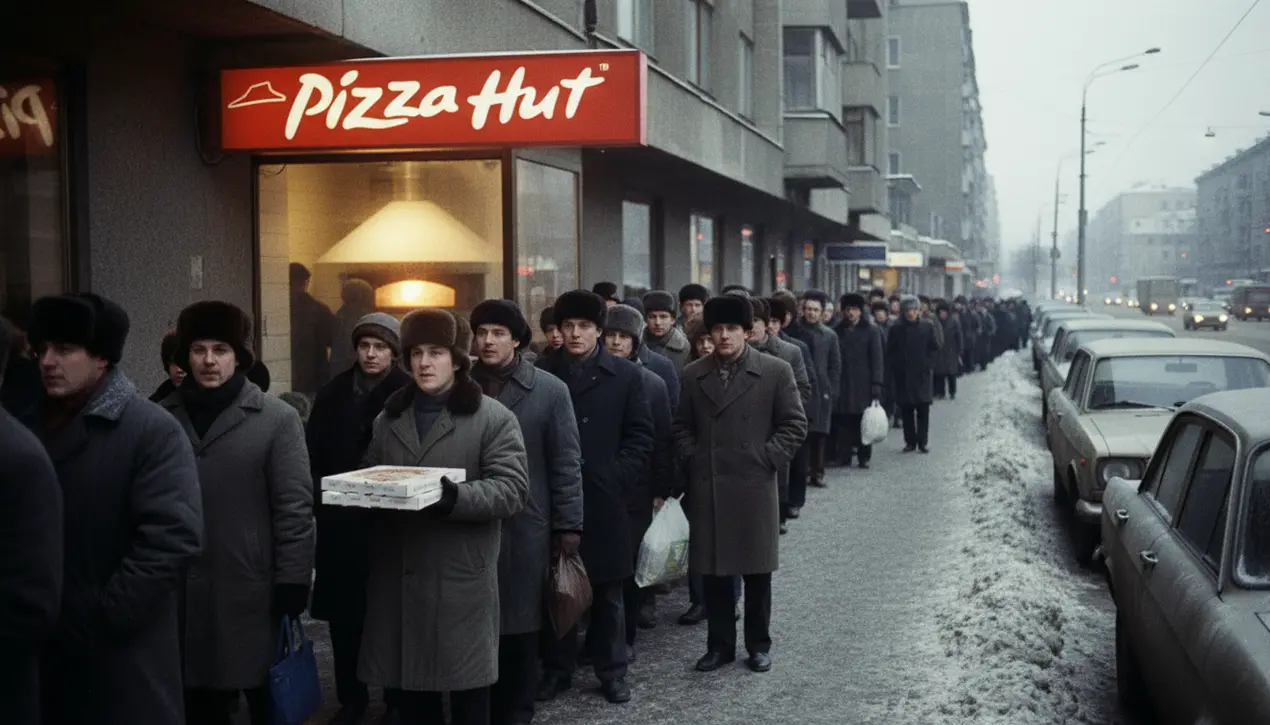
PoliticsdiplomacyCultural Diplomacy
Pizzastroika: American Subversion in Moscow During the Cold War.
RO
Robert Hayes
1 hour ago7 min read
In the twilight of the Cold War, a peculiar and potent form of American subversion was deployed not in the form of a spy or a missile, but with a pizza. The year was 1990, and the Soviet Union was in its death throes, its economy faltering and its political legitimacy crumbling under the weight of glasnost and perestroika.Into this fraught landscape stepped a culinary insurgent: the American pizza parlor. This was not merely a business venture; it was a profound ideological incursion, a soft-power offensive that struck at the very heart of the Soviet social contract.For decades, the Kremlin had defined itself in opposition to Western consumer culture, portraying it as decadent and hollow. The arrival of a genuine American pizza joint in Moscow, therefore, was a symbolic act as significant as any diplomatic communiqué.It presented Muscovites with a tangible, edible alternative to the drab offerings of the state-run stolovayas, where the concept of customer service was as foreign as the ingredients now being imported. This was capitalism served on a paper plate, and its impact was immediate and visceral.Long queues of ordinary Soviets, waiting for hours for a taste of Chicago-style deep dish, were not just lines for food; they were queues for a different way of life, a silent but powerful referendum on the failures of the command economy. The scene echoed historical precedents where cultural artifacts presaged political shifts, much like how blue jeans and rock 'n' roll music had earlier seeped through the Iron Curtain, eroding ideological certainty from within.Analysts at the time, and historians since, have noted that such cultural exchanges often do more to dismantle enemy morale than overt propaganda. The pizza served as a delicious, greasy argument for individual choice and market economics, demonstrating a prosperity and accessibility that the Soviet system could not match.It was a masterstroke of public diplomacy, a gastronomic beachhead that made abstract concepts like 'freedom' and 'choice' suddenly, deliciously real. While the tanks remained in their garrisons and the summits continued, this 'pizzastroika' was fought on the front lines of daily life, and its victory, though now largely forgotten, was a telling indicator of the ideological battle that the Soviet Union had already lost. The fall of the Berlin Wall was a geopolitical earthquake, but the opening of a pizza shop in Moscow was one of the countless tremors that made it inevitable, a small, savory detail in the grand narrative of the Cold War's end that deserves its place in the historical record.
#Cold War
#American subversion
#Moscow
#1990
#food history
#cultural exchange
#editorial picks news
Stay Informed. Act Smarter.
Get weekly highlights, major headlines, and expert insights — then put your knowledge to work in our live prediction markets.
Related News
Comments
Loading comments...
© 2025 Outpoll Service LTD. All rights reserved.